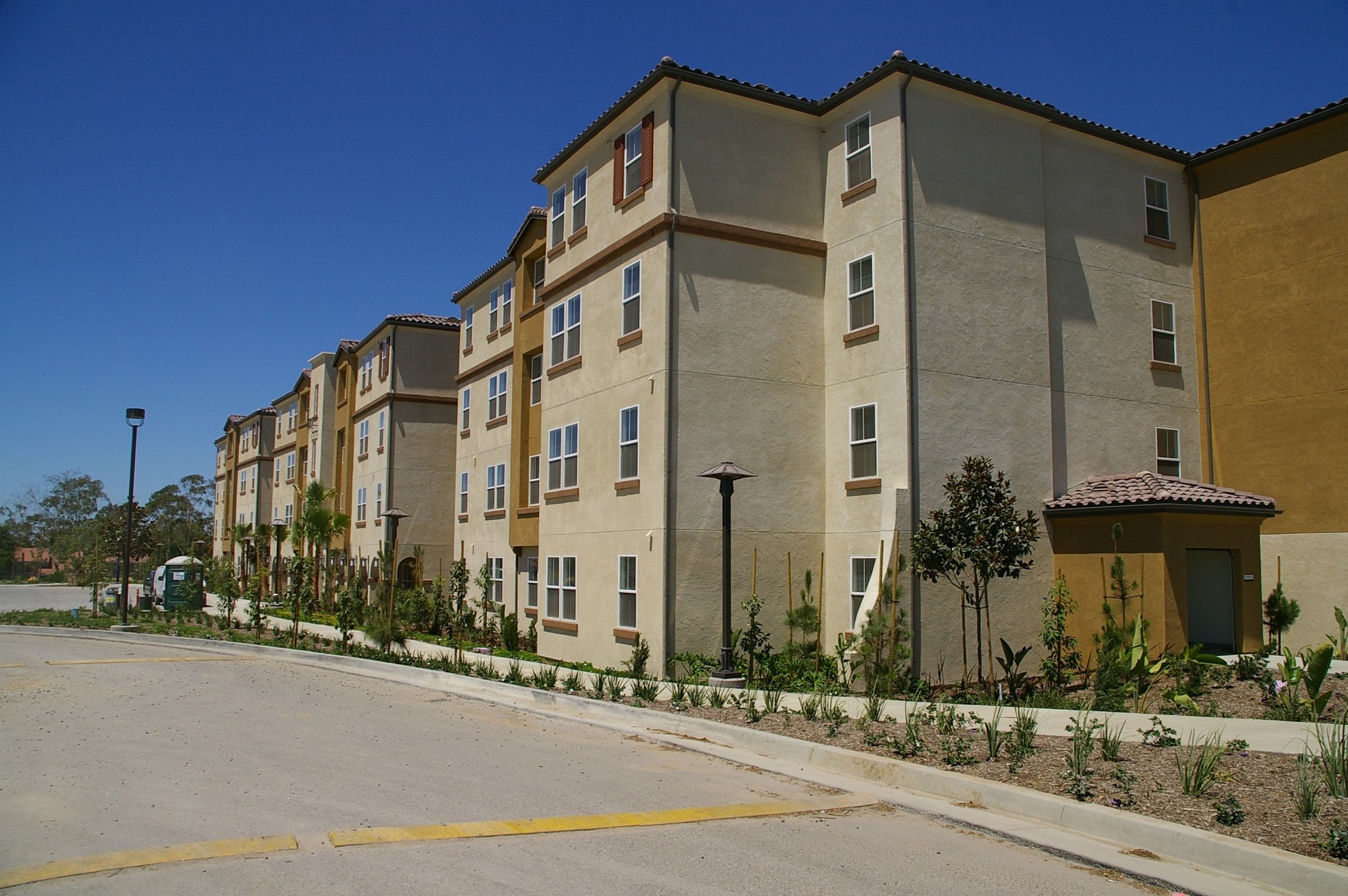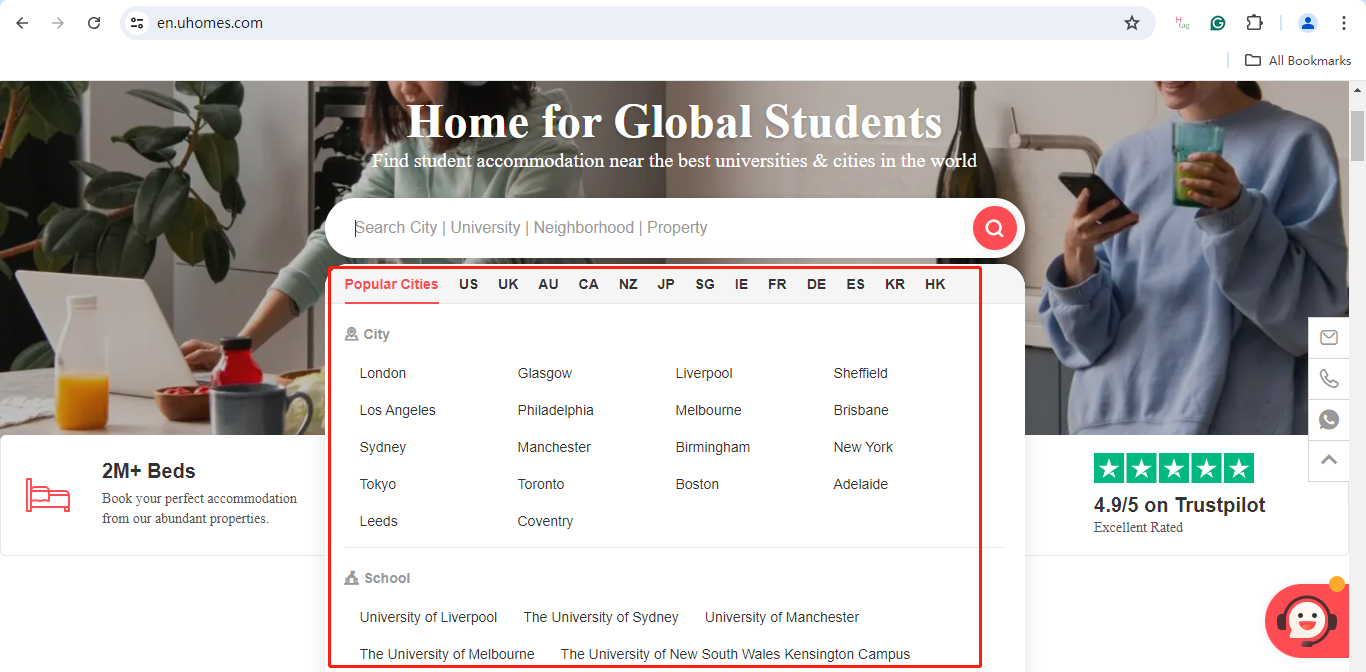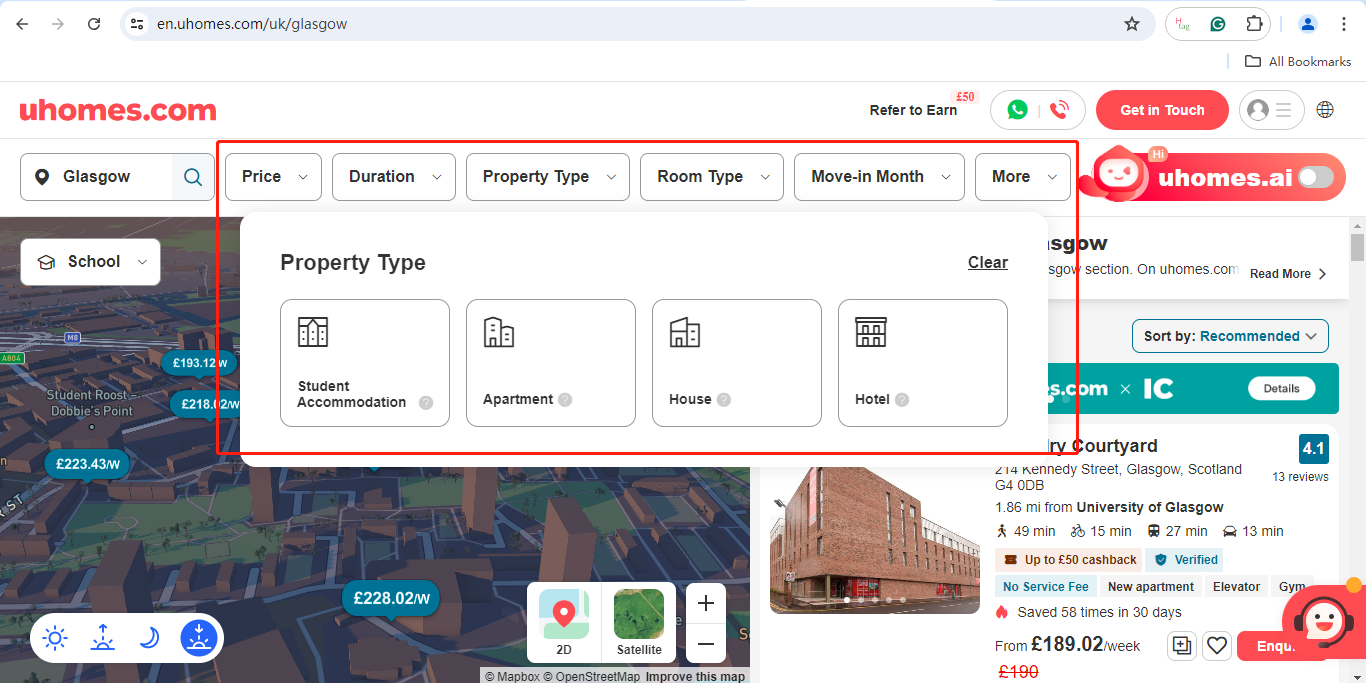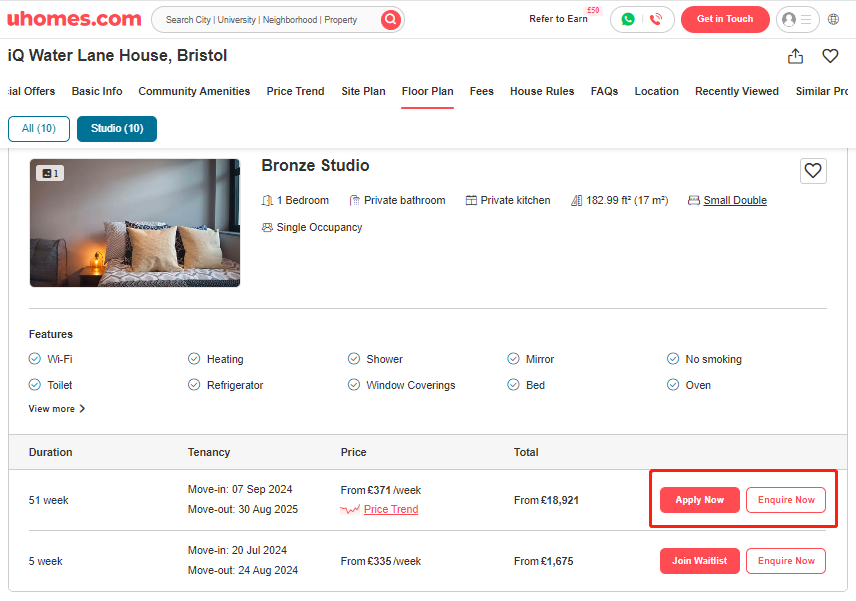First of all, congratulations! It’s time for you to start your university life. But how to apply for student accommodation? Unlike high schools, your university may be far from home, and you have to deal with different environments, accents, customs and so on. How can you adapt to these changes more quickly? The first and most important thing is to find a comfortable and affordable place to live. However, most of you have never rented an apartment before, and do not know how to apply for student accommodation. Don’t worry. Here’s a detailed guide to help you out.
When to apply for uni accommodation?
Generally speaking, after receiving the offer, students will be provided with a list of accommodations to choose from. The number of student accommodation is usually limited, making it difficult to apply for. The management system of each university is different, so students need to pay attention to your university’s websites and other information channels, so as to get the information, including application time, application requirements, etc.
Social accommodation generally appears in June to July, that is, 2 to 3 months in advance. Because the current lessee generally needs to inform the management company or the landlord two months in advance whether to renew the lease. Therefore, to reduce unnecessary troubles, in general, only after confirming that the lease will not be renewed, the rental information will be released. To find comprehensive listings of accommodation near your university, check uhomes.com and click on the university you will attend to see full listings and detailed descriptions.
How to apply for student accommodation?

How to apply for accommodation? Student accommodation at university can be divided into on-campus student accommodation and off-campus student accommodation. The two types of accommodation are described in detail below, and we will mention their pros and cons, as well as the process to apply for accommodation
1. How to apply for uni accommodation: on-campus student accommodation
The on-campus student accommodation is a dormitory directly managed by the university. Applications need to be submitted from the school’s official website. Students should apply for multiple rooms, and then the university will allocate these rooms according to their own rules.
Advantages:
- It is close to the university, so that you can walk almost everywhere.
- Maintenance is timely.
- There is a dormitory administrator who will manage almost everything about the dormitory.
- High security.
Disadvantages:
- Facilities are usually old.
- Some infrastructure, such as elevators, may be missing.
- Students cannot choose the dormitory they want, and these rooms need to be assigned according to the university.
Application process:
The application process is different for each university. The following will take UCL as an example.
- Check your eligibility.
- Choose preferences.
- Submit application.
- Relax.
- Accept.
2. How to apply for uni accommodation: off-cuampus student accommodation
- Off-campus student accommodation is generally operated by management companies and are generally cheaper than on-campus student accommodations, and you can also choose an apartment according to your preference. If you are coming to university with friends, it is recommended to select an off-campus apartment, so that you can choose to live in the same building.
Common apartment management companies include IQ and Unite Students. Off-campus accommodations are generally available on the university’s website and can also be found and booked on platforms such as uhomes.com. These apartments usually cooperate directly with the platform, so the price is the same whether you choose to book on the official website yourself or choose to let an agent book for you. And uhomes.com also has activities, like cashback, that allow you to rent a cheaper apartment in a faster, less stressful way.
Advantages:
- There are also usually certain management and maintenance standards to ensure the quality of living.
- Some additional services may be provided, such as cleaning, maintenance, etc.
- There are complete facilities, such as gym, study room, etc.
- The price may be relatively reasonable, and usually covers most utility fees.
- Most people who live here are students.
- It has high security.
- Compared with most other accommodation outside the university, it is clost to the campus.
Disadvantages:
- There are public areas, which may cause conflicts with classmates.
Application process:
How to apply for student accommodation? We chose uhomes.com as the example because applying for off-campus accommodation through these platforms is more economical and convenient. Most of these applications do not charge fees, and you may even be given cash back because we work directly with the apartments.
- Identify which city’s student accommodation you will live in.
- Figure out what types of rooms you prefer with the help of uhomes.com filters. You can select some basic information, such as price, duration, property type, room type, move-in month, etc.
- Click the property you prefer, and go to the property page.
- If you are satisfied with this property, click “apply now”; If you still have some questions, click “enquire now”. Our consultants are online 24/7 to answer your questions and help you until you sign a rental contract.
- Complete the application form and submit it under the guidance of your uhomes consultant.
- With the help of your consultant, you can view properties online and find a proper apartment.
- Pay the deposit.
- Sign the contract.
Who is eligible to apply for student accommodation?
Each university’s requirements are different every year, so please pay attention to your university’s official website. Here we take UCL as an example.
UCL guarantees accommodation to students who are under 18 years old or with additional requirements.
Undergraduate students are eligible for a prioritised place in UCL accommodation if they:
- are a full-time student
- are in their first year at UCL or are attending UCL for a full academic year on Junior Year Abroad (JYA) Erasmus, or Exchange programmes
- apply for a single room (we have very limited couples and family accommodation)
- have not previously lived or studied in Greater London at a Higher Education Institution (University). If you went to secondary school in London or if your home address is in London, you still meet the eligibility criteria
- list UCL as their firm choice by 10 June 2024
submit their UCL Accommodation application (separate to application to study) by 10 June 2024
Postgraduate students are prioritised for an offer of accommodation if they:
- are an international, full-time student
- are in their first year at UCL
- apply for a single room (we have very limited couples and family accommodation)
- have accepted an offer to study for a full-time Masters’ programme, Postgraduate Diploma, MPhil or PhD, or full-year affiliate programme at UCL by 30 June 2024
- have not previously lived or studied in Greater London at a Higher Education Institution (University). If you went to secondary school in London or if your home address is in London, you still meet the eligibility criteria
- submit their UCL Accommodation application (separate to application to study) by 30 June 2024
Comparing different types of accommodation

No matter you choose to study in the UK or the US, providing students from all over the world with a variety of choices. Whether you are a new student seeking convenience and social interaction, or a senior student who values independence and freedom, you can apply for the ideal student accommodation to live to meet your needs.
From traditional student dormitories with a long history, to well-equipped and modern apartments, from on-campus residence halls, which are closely connected to the teaching areas, to off-campus rentals scattered throughout the city, each accommodation type has unique advantages and characteristics.
These different accommodation options not only affect the students’ daily life, but also shape their learning environment and social circle to some extent. Let’s delve into the most common types of student accommodation to help select satisfying accommodation for students who are about to embark on their brand new study trip.
Generally, student accommodation can be divided into five categories.
1. University-owned accommodation (halls)
University-owned accommodation is the accommodation directly owned and managed by the university. They are often located on or near campus. Its most significant advantage is its convenient location, which allows students to easily reach the teaching building, library and other campus facilities, saving time and transportation costs to and from school. The university will conduct unified management of these accommodations, and the services and facilities will be relatively standardized. In terms of price, it is usually set by the university and may be included in the tuition fee, or it is charged according to the price standard stipulated by the university, which is relatively stable and transparent.
Advantages:
- The location is usually close to campus for easy access to classrooms and school facilities.
- Security is usually assured, with school management and security measures.
- Basic furniture and facilities are provided for easy stay.
- It is easy to communicate with classmates and integrate into campus life.
Disadvantages:
- The choice may be limited, and room types and styles are usually homogeneous.
- The price may be relatively high.
- There may be more rules and restrictions to follow.
2. Managed partnership accommodation/Purpose-built student accommodation (PBSAs)
This type of accommodation is introduced by the university in cooperation with private accommodation providers. Although managed by a third-party company, it is also an option to provide student accommodation services. Its cooperation mode makes the operation more commercial and market-oriented. In terms of service provision, it may combine the university’s requirements and the market’s demands to provide services similar to but slightly different from the university-owned accommodation. The price may be more flexible than the university-owned accommodation and may not be included in the tuition fee. You can go to uhomes.com to see the specific conditions and rules of these apartments.
Advantages:
- There are also usually certain management and maintenance standards to ensure the quality of living.
- Some additional services may be provided, such as cleaning, maintenance, etc.
- There are complete facilities, such as gym, study room, etc.
- The price may be relatively reasonable, and usually covers most utility fees.
- Most people who live here are students.
- It has high security.
- Compared with most other accommodation outside the university, it is clost to the campus.
Disadvantages:
- There are public areas, which may cause conflicts with classmates.
3. Rented apartments/Built-to-rent apartments (BTRs)
Built-to-rent apartments are usually run by private individuals or small companies. They are not directly affiliated with the university, but may be located around it. As it is operated independently, more personalized services may be provided to meet the needs of different students. The price range is also wide, ranging from affordable options to relatively luxurious apartments, which students can choose according to their financial situation and personal preferences.
Advantages:
- Various options, including different room types, locations and price ranges.
- You can experience the local lifestyle and culture.
- There may be fewer rules to obey.
Disadvantages:
- The quality varies and requires careful selection.
- There may be language barriers or cultural differences.
- Security may not be as guaranteed as in university-related accommodations.
4. Private house shares/House of multiple occupancy (HMOs)
These properties are managed by their own hosts or an estate agent. According to its name, we can see that it is a house where several people live. These houses are big with several bedrooms, and usually far from the city centre.
Advantages:
- You can experience the local lifestyle and culture.
- There may be fewer rules to obey.
Disadvantages:
- The quality varies and requires careful selection.
- There may be language barriers or cultural differences.
- Security may not be as guaranteed as in university-related accommodations.
- It is usually far from your university.
5. Homestays
Homestays are a less common option for many students. Students will live in the vacant rooms provided by local families for short term.
Advantages:
- You can experience the local lifestyle and culture.
Disadvantages:
- It is hard to identify the quality of your host family before.
- There may be language barriers or cultural differences.
- The duration of residence usually short.
Comparing different types of rooms

To thoroughly know how to apply for accommodation, you must clear what type of room you can choose from. In the UK property market, various room types are available to meet the needs of different occupants. Among them, ensuite, studio, single room, 1b1b and other rooms are particularly common, and each has its own unique characteristics and charm.
1. Ensuite
- Facilities: a private bedroom, an independent bathroom, a shared kitchen
- Pros: easy to communicate with roommates; more affordable
- Cons: may have problems with your roommates
2. Studio
- Facilities: a private bedroom, an independent bathroom, an separate open kitchen
- Pros: all the space can be arranged by youself, not shared with others
- Cons: the smell of cooking may be strong; more expensive
3. Non-ensuite/Single room/Private room
- Facilities: a private bedroom, a shared bathroom, a shared kitchen
- Pros: easy to clean; more affordable
- Cons: shared space is large, easy to have conflicts; there may be mixed sex housing
4. 1b1b/one-bedroom and one-bathroom flat
The first “b” represents the bedroom, and the second represents the bathroom. There are also other types of flats, such as 2b1b, 2b2b, 3b2b and so on.
- Facilities: a private bedroom, an independent bathroom, an independent kitchen, an independent living room
- Pros: good privacy; no cooking smoke trouble
- Cons: require the ability to live; more expensive
5. Shared room/Twin room
- Facilities: a private bedroom with two beds, an independent bathroom, a shared kitchen
- Pros: larger space; more affordable
- Cons: shared space is large, and have to get along with your roommates
6. Standard room/Single room
- Facilities: a private bedroom, a shared bathroom, a shared kitchen
- Pros: more affordable; easy to clean
- Cons: shared space is large
Tips for applying for student accommodation:
Here are some tips helping you apply for student accommodation.
Things to consider when choosing an accommodation.
- It is better to rent an accommodation near the university. For example, living in a London apartment makes transport very expensive. Besides, buses are often diverted and delayed.
- It is best to choose accommodation where the rent covers bills. If not, remember to choose low energy consumption, that is, high EPC level.
- The room’s floor is best not to choose carpet, because it is difficult to clean.
- If you want to use your own shower head, check to see if the shower head in the bathroom can be removed.
- If you can see the apartment on site, knock on the wall to see if it is hollow. If it is hollow, the sound insulation will be poor.
- Confirm whether the delivery has a reception or if someone must be at home to collect it.
- It is recommended to rent a relatively new apartment. Older apartments may have outdated or even lacking amenities.
Be sure to do a inventory before moving in.
Here are some tips for inventory.
- The cost of inventory is generally paid for by landlords and agents.
- The inventory is inspected and marked by a third party.
- The inventory is usually given to you on the day you pick up the keys, and you will have 7 working days to confirm or modify its contents. If you find problems, contact the third party to correct them.
- Sometimes the private landlord does not provide inventory. You can ask a friend to be a witness, take detailed notes of the condition of the house, and take photos for identification.
Choose a qualified agent or a formal application channel.
Besides the official websites of universities, it is recommended to choose a qualified agent, like uhomes.com. Most accommodations work directly with the providers, so no agent fees exist. Not only is it easier to apply for, but it also saves money, because we often have cash-back activities.
Be sure to sign the rental contract before moving in.
Please be sure to read the rental contract carefully before signing. Here are some clauses to be aware of.
- How long is the rental contract signed, and how long should notice be given before moving out?
- In which cases, the landlord is responsible for maintenance, and in which cases, the tenant is responsible?
- Make sure the deposit is given to a third-party platform and not kept by the landlord himself.
How to apply for student accommodation is no longer a problem
After learning the above information, do you have a clue how to apply for student accommodation?
First and foremost, you need to be clear about your needs and budget. Do you want to experience the local culture more deeply, or do you want to communicate more deeply with your classmates? Do you hold parties a lot, or do you prefer to study quietly? Only when you understand this information can you proceed to apply for accommodation. If it is an on-campus student accommodation, please pay close attention to the university’s website and other information channels, and submit your application in time for the university’s allocation. If you want to select other accommodation types, you can choose uhomes.com to make completing apartment screening and booking easier. It’s all up to you.
Most importantly, after reading this article, how to apply for student accommodation is no longer your problem, and you are about to start a new phase of your life!
FAQ
Accommodation at a university in the UK is really expensive, especially in London. Don’t worry. Booking at uhomes.com can participate in the cash-back activities. In addition, the British government also provides some funding for university student accommodation, such as the residential bursary fund and the residential support scheme. More information can be found on the related UK government website.
Some universities allow you to apply for accommodation at your insurance choice, while most universities do not allow you to do that. It depends. Please keep an eye on the notice on the university’s website.
Usually, university accommodation is not offered on a first come, first served basis due to the complexities of the allocation process, but you’d better apply as soon as possible.
Usually, you need a guarantor to rent an apartment in the UK unless you can pay a full-year rent upfront. But for some student accommodation, you don’t need to provide a guarantor to pay in installments. You’d better know the rules of the accommodation you’ll be living in in advance.
Generally speaking, non-students are not allowed to stay in on-campus student accommodation. However, off-campus student accommodation can be occupied by non-students, but you may have to pay council tax yourself. It depends on several factors and have to consider many elements. Please consult our consultants in charge of student accommodation in the UK for details.
| University | Application dates for undergraduates | Application deadlines for undergraduates | Application dates for postgraduates | Application deadlines for postgraduates |
|---|---|---|---|---|
| UCL/University College London | at the end of March each year | 10 June | at the end of March each year | 30 June |
| Imperial College London | late May | 19 July | late May | 21 July |
| University of Edinburgh | when you have accepted your offer | 72 hours from when you have accepted your offer | when you have accepted your offer | 72 hours from when you have accepted your offer |
| University of Manchester | as soon as you have an offer | 31 August | as soon as you have an offer | 31 August |
| University of Bristol | 5 March | 30 June | 5 March | 30 June |
| University of Shelffield | March | June | March | June |











